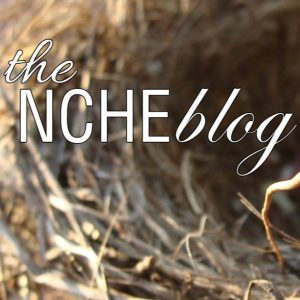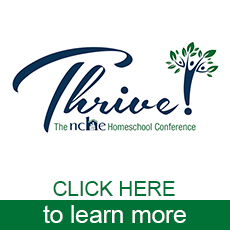 by Jessica Frierson, February 2023
by Jessica Frierson, February 2023
Homeschool students with disabilities may be eligible for funds through the North Carolina State Education Assistance Authority (NCSEAA). You may have heard of the ESA+ scholarship but read on to learn more because a lot has changed to make it more accessible to families. I will share with you what I have learned from Kathryn Marker, Ph.D., the Director of Grants, Training, and Outreach at NCSEAA, and will walk you through the steps to apply for and use ESA+ funds for your child.
We at NCHE have heard from many families that it has been difficult to become eligible for these funds. Those who managed to do so reported that determining what items or services are qualified purchases was the next obstacle. Dr. Marker explained, “Not understanding what the funds could be used for, and where to find providers or certain products, was definitely a pain point for homeschool families last spring and early fall.” However, NCSEAA has taken steps to alleviate both hurdles. “The website, for example, now has detailed explanations of the ESA+ allowable expenses, and directions for how to purchase products or pay for services.”
The application period opened on February 1. Priority is given to those who apply by March 1 so don’t delay if you want to qualify for the scholarship! If you do not already have an IEP in place for your child, start now, and aim for the 2024-25 school year. Here are the steps to take.
1. Obtain an IEP.
The crucial first step is to obtain an Individualized Education Plan (IEP) from a public school.
First-time applicants must take this step. As Dr. Marker shared in a recent presentation to the DPI Parent Advisory Commission, “there is no other way to document a disability for the purposes of the ESA+ program. A 504 plan, private evaluations, and medical diagnoses do not qualify a student for the ESA+ program.” However, she shared a great resource for assistance in obtaining this. The Exceptional Children’s Assistance Center (ECAC) is a nonprofit which, among many other valuable resources, “assists parents with the IEP process.”
Reevaluation for those who have received the scholarship in the past has an alternative, but this must be done through a public school the first time. It is then valid for three years before a new one is obtained. You will be notified when your child is due to recertify. The feedback we have from parents is that it may take repeated phone calls to get this set up with your school district.
Who qualifies for an IEP?
The IEP team must determine that a child has at least one disability listed among the thirteen categories defined by the Individuals with Disabilities Education Act (IDEA), and that it would adversely affect their educational performance. The thirteen categories of disability include:
- Autism Spectrum Disorder
- Deaf-Blindness
- Deafness
- Emotional Disturbance
- Hearing Impairment
- Intellectual Disability
- Multiple Disabilities
- Orthopedic Impairment
- Other Health Impairment
- Specific Learning Disability
- Speech or Language Impairment
- Traumatic Brain Injury
Source: 13 Categories of Disability Under IDEA Law – B.I.G. Solutions, LLC (behavioralinspiredgrowth.com)
Here are the other program requirements from PowerPoint Presentation (ncseaa.edu):
All Required:
- Is a child with a disability who requires special education as documented by a NC public school IEP Eligibility Determination
- At least 5 years old by August 31 or at least 4 by April 16 and approved for kindergarten according to state guidelines
- Lives in NC
- Has not graduated from high school
- Has not enrolled in a post-secondary institution full-time*
- Eligible to attend public school in NC.
Students who meet the criteria outlined above and have one of the following designated as the primary or secondary disability on the IEP Eligibility Determination may be eligible for a higher scholarship award than full-time students without these designated disabilities. Terms listed in parentheses as they appear on the Eligibility Determination:
- Autism (Autism)
- Hearing Impairment (Hearing Impairment, Deafness, Deaf-Blindness)
- Moderate or Severe Intellectual or Developmental Disability (Intellectual Disability, Moderate or Severe)
- Multiple, Permanent Orthopedic Impairments (Orthopedic Impairment)
- Visual Impairment (Visual Impairment, Deaf-Blindness)
*Full-time: 12 or more credit hours in a given semester.
Students funded in the prior year receive priority consideration.
Source: PowerPoint Presentation (ncseaa.edu)
2. Set up an account in My Portal. Welcome to MyPortal (ncseaa.edu)
3. Apply for the ESA+ scholarship through the Portal.
There is a video tutorial and other information on the application process here.
4. Once approved, the recipient’s funds are utilized through a platform called ClassWallet.
The payment process for all items is now handled through ClassWallet, which hosts the online account on behalf of the ESA+ program.Parents will find that this will simplify the confusing labyrinth parents were formerly navigating. Now, you sign in to your ClassWallet account and shop within the online marketplace they have created.
5. What are allowable expenses?
- Tutoring: “Tutors must be registered with and approved by SEAA to participate in the ESA+ program. Tutoring services must be related to one of the following academic subjects: math, science, English/language arts, social studies, or foreign languages.”
- Educational therapy: It must be adaptive/therapeutic in nature or designed for students with special needs to meet the qualifications, and the provider must be registered and approved by SEAA to participate in the ESA+ program. Some types of therapy approved are applied behavior analysis therapy, speech therapy, occupational therapy, physical therapy, music therapy, art therapy, and therapeutic horseback riding lessons/equine therapy.
- Curricula: The guidelines for qualifying curriculum materials state that they “should provide academic instruction or information (such as booklets or lesson plans) or an opportunity for a student to practice an academic skill”, must be within three grade levels of the student’s current grade level (you can leave a note explaining the situation if you need an exception made to this rule), and must clearly support one of these academic subjects: math, foreign language, science, social studies, or English/language arts. Also included are lesson plans, learning kits, or workbooks that supplement an academic subject. Consumable supplies such as pencils, printer ink, or notebooks are NOT allowable expenses. There are currently twelve curricula providers listed on the NCSEAA Provider Search database:
-
- Rainbow Resource Center, Inc.
- APT to Learn
- Readability
- The Good and the Beautiful
- Brave Writer LLC
- Gander Publishing, Inc
- Layers of Learning
- Writing Wonders
- Noeo Science
- Teaching Textbooks LLC
- Beautiful Feet Books
- Intoxicated on Life/Journey Homeschool Academy
-
- Transportation to/from educational activities or services
- Standardized test fees
- Educational technology: These items fall under several categories.
- Vision
- Speech
- Hearing communication
- Learning, cognition, and development
- Computers
- Miscellaneous
-
The NCSEAA website explains that for educational technology products, “ESA+ funds cannot be used for the same category of item within three school years, or for any item over $600. For example, a tablet purchased in 2022-2023 (fall or spring) cannot be purchased again until the 2025-2026 school year. Note that a tablet / iPad is one category of computer. A laptop / desktop is a different category.”
In a follow-up phone call with Dr. Marker, I asked how parents could determine whether an item they wished to purchase met the criteria to be an allowable expense. “Parents shop from the list of authorized vendors within the online marketplace on ClassWallet. The order is then sent to ESA+ for approval. Upon approval, the cost of the items is deducted from their Wallet and the items are shipped to their home,” she told me. “The authorized vendors include curricula companies as well as large retailers such as Amazon.” Familiarizing yourself with the allowable items will make the shopping experience easier and the approval process smoother.
6. Common misconceptions:
- Prior enrollment in a public school. FACT: There is no requirement for a child to have been previously enrolled in a public school to be eligible for an ESA+ scholarship.
- Reimbursement of expenses. FACT: There is no reimbursement for materials or services. All purchases are made through the ClassWallet platform. Invoices are submitted for some services, but the payment goes directly to the provider.
7. Still need help?
For additional support and assistance for your family, check out the Exceptional Children’s Assistance Center. They are a great resource. Their staff has been specifically trained to help parents with children who are not in traditional public schools. Their services are provided at no cost to North Carolina families. As their website says, they “help parents navigate the special education system, know their rights, and use their voice…provide information, support, training, and resources to assist families caring for children with special needs from birth to age 26.”
If you have questions about initiating the special education process, timelines, evaluations, reevaluations, and/or eligibility, please contact the Exceptional Children’s Assistance Center (ECAC) at 1-800-962-6817 or ecac@ecacmail.org. ECAC provides NC families with tools, resources and information to help them make informed decisions and become their child’s best and most effective advocate. ALL of ECAC’s services to families are provided at no cost.
And as always, we at NCHE are here to help you homeschool with confidence and joy. Our homeschool helps director, Amanda Wares, has put together a page with answers to your FAQs and a list of helpful resources. If you have questions for Amanda, you can email her at helps@nche.com. Be sure to join our Facebook group for Homeschooling with Special Needs. And check out the Homeschool Show on Youtube or your favorite podcast provider, where you can find tips, encouragement, and the latest homeschool news on our weekly broadcast.
 Jessica Frierson is a second-generation homeschooler. She is married to Ernie, a retired minister. They have been homeschooling their seven sons and three daughters since 2000. She is a speaker and writer. She serves as the secretary for NCHE, writes for GREENHOUSE, and is the lead blogger for the NCHE blog.
Jessica Frierson is a second-generation homeschooler. She is married to Ernie, a retired minister. They have been homeschooling their seven sons and three daughters since 2000. She is a speaker and writer. She serves as the secretary for NCHE, writes for GREENHOUSE, and is the lead blogger for the NCHE blog.




